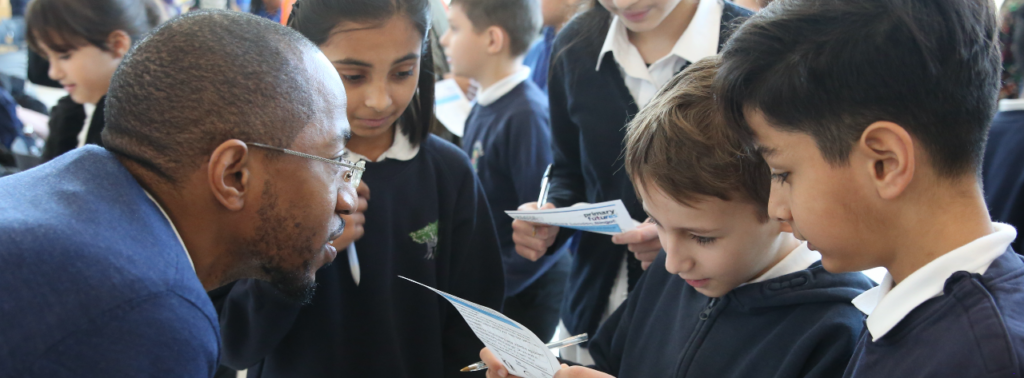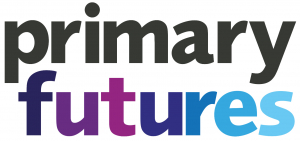In 2022 we worked on showcasing potential career paths in infrastructure and construction to primary school children: a new sector-specific approach to reaching underrepresented groups at an early age.

Project background
Some groups are underrepresented in London’s workforce, including in the infrastructure and construction sectors.
As part of a range of interventions to expand talent pipelines, we were commissioned by The Mayor of London’s Workforce Integration Network (WIN) and the GLA’s London Infrastructure Group (LIG) to deliver the Building Future London pilot project.
Building Future London gave year 5 and 6 school children the opportunity to take part in a variety of activities, meeting and talking with the people who help build their city. This marks a new sector-specific approach at primary-age, with a particular focus on reaching underrepresented groups in construction and infrastructure.
The project ran May-December 2022 as part of our established Primary Futures programme, and builds on the Starting Early (2021) report which shows how meeting diverse workplace role models at primary-age has a positive impact on children’s futures.
“To have such a range of volunteers that truly reflected our community makeup was incredibly powerful.”
Teacher, Dairy Meadow Primary School
Project aims
- Pupils, teachers, and parents to better understand the world of construction and infrastructure, the range of jobs available, and the link between learning and work
- Challenge stereotypes and broaden horizons for pupils, showing the wide range of opportunities construction and infrastructure offer for people from all backgrounds, while targeting under-represented groups in the sectors
- Support employers to connect with primary schools and create ongoing relationships, and secure new sector-related volunteers and resources for Primary Futures

Bringing the world of work to life
Nearly 3,500 children from 30 primary schools across London were reached through the project, far exceeding the initial target of 1,800 pupils. Participating schools all had a high proportion of pupils from underrepresented groups in the sectors.
75 volunteers from a range of employers in infrastructure and construction took part in activities, including Transport for London, Jacobs, Tideway, SGN and Virgin Media. Volunteers were drawn from participating employer networks and the wider sector, including existing Primary Futures volunteers.
“I used to believe that I would be a famous YouTuber when I grow up – but after meeting the civil engineer I knew that that job suited me.”
Key stage 2 pupil
Activities included:
- A live virtual multi-school activity – kickstarting the project, children took part in activities to help them to think about jobs involved in the built environment, listened to talks from two volunteers about their careers and jobs, and asked questions to find out more
- 31 bespoke careers sessions with a range of volunteers – following a Q&A format or the ‘What’s My Line?’ job-guessing game, designed to tackle stereotypes. Most sessions took place in person and all sessions included starter and reflection activities to help children better understand the sectors and consolidate their learning
- Creation of new video resources – featuring the stories of five sector volunteers, with workplace and onsite images and footage, and pause points for discussion and reflection
- Jobs of the Future Competition – children were asked to invent a job of the future to address a real-life challenge in construction and infrastructure. Prizes donated by employers included school trips to the HS2 Euston site, the Transport Museum, Brunel Museum, and the Elizabeth Line
- A celebration event at City Hall – Muyiwa Oki, the first black president-elect of RIBA, discussed what inspired him to become an architect, and winners of the Jobs of the Future Competition shared their reflections on taking part in the project
All project delivery targets were met or exceeded.
Meet the volunteers from the video

- Architect Kuljeet talks about designing for inclusion and diversity
- Gas Network Officers Grace and Christine explain how geography, problem-solving and underground robots help to maintain gas pipes
- Geospatialist Francesca reveals how making maps can minimise the impacts of big projects
- Mechanical Engineer Temi talks about combining engineering and people skills
Exploring children’s aspirations and curiosity
Research as part of the project showed children care about their city, especially in relation to environmental issues such as pollution, air quality and climate change. Curiosity levels were lower but still significant about how things are built and where water, gas, and electricity come from.
Findings also reflected larger national studies showing that boys are more interested in STEM-related jobs than girls, and that aspirations are often high among pupils who qualify for free school meals.
Making a difference
Following activities, the majority of teachers surveyed said their pupils had:
- broadened their horizons
- learned about new jobs they did not know about before
- understood that learning at school is good for future opportunities
- learned there are lots of jobs that use science and maths
Pupils reported gains in knowledge about types of jobs over the project, especially in construction, energy and engineering, and further gains in feeling jobs are open to them in London when they grow up.

Ongoing benefits
The project helped teachers engage with employers they had not worked with previously, leading to ongoing relationships and new opportunities. These include a visit to the HS2 site, future STEM workshops, and involving children in a project to design future London spaces.
There are also benefits to the wider Primary Futures programme, with direct approaches to the Primary Futures team from volunteers and employers wanting to engage in future activities. Many teachers say they will continue to use the platform.
“Celebrating Building Future London with young Londoners is key to raising aspirations and welcoming diverse talent to our sector.”
Muyiwa Okiaph
What next?
The success of Building Future London presents various opportunities to extend and consolidate the impact of the project, subject to funding. These include:
- Rolling out the project to other primary schools in London, expanding its reach across more schools and boroughs
- Exploring ways to harness the curiosity and high aspirations identified in many underrepresented groups in these sectors, to extend into secondary education and beyond
- Adapting activities to be fully inclusive, drawing on the experience of involving a deaf school in the project
- Continuing to recruit volunteers and employers across the sector to further expand the volunteer pool to meet school demand, and to ensure all roles and demographics are well represented
Find out more
Read about the project launch and the City Hall celebration event on the Education and Employers website.
Find out more about Primary Futures.

